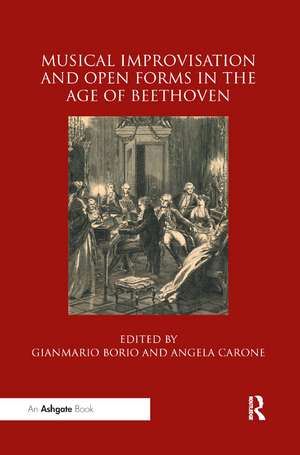Musical Improvisation and Open Forms in the Age of Beethoven
Editat de Gianmario Borio, Angela Caroneen Limba Engleză Paperback – 12 dec 2019
Improvisation was a crucial aspect of musical life in Europe from the late eighteenth century through to the middle of the nineteenth, representing a central moment in both public occasions and the private lives of many artists. Composers dedicated themselves to this practice at length while formulating the musical ideas later found at the core of their published works; improvisation was thus closely linked to composition itself. The full extent of this relation can be inferred from both private documents and reviews of concerts featuring improvisations, while these texts also inform us that composers quite often performed in public as both improvisers and interpreters of pieces written by themselves or others. Improvisations presented in concert were distinguished by a remarkable degree of structural organisation and complexity, demonstrating performers’ consolidated abilities in composition as well as their familiarity with the rules for improvising outlined by theoreticians.
| Toate formatele și edițiile | Preț | Express |
|---|---|---|
| Paperback (1) | 389.38 lei 6-8 săpt. | |
| Taylor & Francis – 12 dec 2019 | 389.38 lei 6-8 săpt. | |
| Hardback (1) | 821.94 lei 6-8 săpt. | |
| Taylor & Francis – 11 dec 2017 | 821.94 lei 6-8 săpt. |
Preț: 389.38 lei
Nou
Puncte Express: 584
Preț estimativ în valută:
74.51€ • 77.29$ • 62.13£
74.51€ • 77.29$ • 62.13£
Carte tipărită la comandă
Livrare economică 27 martie-10 aprilie
Preluare comenzi: 021 569.72.76
Specificații
ISBN-13: 9780367884628
ISBN-10: 0367884623
Pagini: 256
Dimensiuni: 156 x 234 x 14 mm
Greutate: 0.45 kg
Ediția:1
Editura: Taylor & Francis
Colecția Routledge
Locul publicării:Oxford, United Kingdom
ISBN-10: 0367884623
Pagini: 256
Dimensiuni: 156 x 234 x 14 mm
Greutate: 0.45 kg
Ediția:1
Editura: Taylor & Francis
Colecția Routledge
Locul publicării:Oxford, United Kingdom
Cuprins
Introduction, Gianmario Borio and Angela Carone; Part I Improvisation and music theory; 1. Formal elements of instrumental improvisation: evidence from written documentation, 1770–1840, Angela Carone; 2. Musical form in improvisation treatises in the age of Beethoven, Jan Philipp Sprick; 3. ‘La solita cadenza’? Vocal improvisation, embellishments and fioriture in opera from the late eighteenth to the first half of the nineteenth century, Torsten Mario Augenstein; 4. ‘Free forms’ in German music theory and the Romantic conception of time, Gianmario Borio; Part II From improvisation to composition; 5. Fantastical forms: formal functionality in improvisational genres of the Classical era, William E. Caplin; 6. Four piano fantasias by Hummel: improvisation, motivic processing, harmonic enterprise and the ‘memory function’, Rohan H. Stewart-MacDonald; 7. A step to the ‘Wanderer’. Schubert’s early Fantasia-Sonata in C Minor (D. 48), Pieter Bergé; 8. Didacticism and display in the capriccio and prelude for violin, 1785–1840, Catherine Coppola; Part III Freedom as a tool for musical form; 9. ‘Quasi una fantasia’? The legacy of improvisational practice in Ludwig van Beethoven’s piano sonatas, Hans-Joachim Hinrichsen; 10. Improvisation practices in Beethoven’s Kleinere Stücke, Marco Targa; 11. The fate of the antepenultimate: fantasy and closure in the Classical style, Scott Burnham; 12. ‘Ad arbitrio dei cantanti’: vocal cadenzas and ornamentation in early nineteenth-century opera, Giorgio Pagannone
Notă biografică
Gianmario Borio is Professor of Musicology at the University of Pavia and director of the Institute of Music at the Giorgio Cini Foundation, Venice. His publications deal with several aspects of the music of the twentieth century, the history of musical concepts and the theory of musical form.
Angela Carone has been a collaborator at the Giorgio Cini Foundation in Venice since 2013. Among other topics, she has published essays on Carl Czerny, Franz Schubert and Robert Schumann’s instrumental works and the concepts of musical work and style in the eighteenth to early nineteenth century.
Descriere
Improvisation was a crucial aspect of musical life in Europe from the late 18th century to the mid-19th. Composers devoted themselves to this practice while formulating the musical ideas found at the core of their published works; improvisation was linked to composition itself. The full extent of this can be inferred from p
